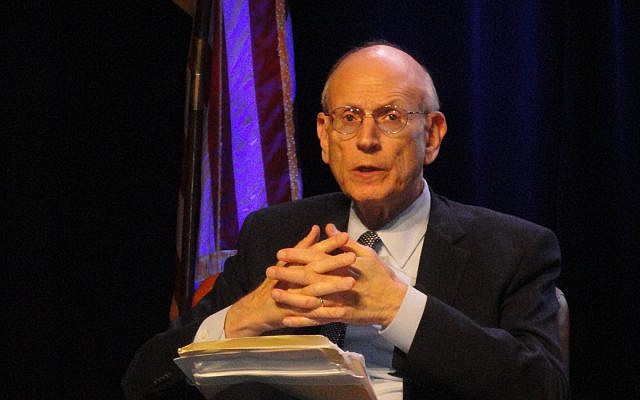Native Son, Stuart Eizenstat defends Jimmy Carter’s Record
Before a large crowd at the Book Festival of the MJCCA, Eizenstat, who was Carter’s principle advisor on domestic policy, defended the record he created in the late 1970s.
Stuart Eizenstat grew up in Atlanta, attended Ahavath Achim Synagogue and became, at the age of 34, one of the most powerful officials in the administration of President Jimmy Carter. Eizenstat came home Nov. 11 to talk about his new book, “President Carter: The White House Years.”
Before a large crowd at the Book Festival of the MJCCA, Eizenstat, who was Carter’s principle advisor on domestic policy, defended the record he created in the late 1970s. Eizenstat described Carter as “the most accomplished and underappreciated first-term president in American history.”
And Eizenstat, like the Harvard-trained lawyer and accomplished litigator that he is, effectively laid out a long list of accomplishments, from energy policy to ethics legislation, that he and Carter pushed through Congress.
In summary, he quoted Vice President Walter Mondale, who described the Carter record as a time when “we kept the peace, told the truth and honored the office.”
Eizenstat’s volume, which was the Book Festival choice as this year’s Esther G. Levine Community Read, is a comprehensive work of more than 900 pages. It not only discusses Carter’s domestic political record, but his foreign policy record as well.
An entire section of the book, almost 150 pages, describes the tortuous process that resulted in the Camp David accords between Israel’s Prime Minister Menachem Begin and Egypt’s President Anwar Sadat. It eventually led to a treaty of peace between Egypt and Israel in 1979 that remains one of the cornerstones of American diplomacy in the region.
Eizenstat described the Camp David agreements at the festival as “the greatest act of personal presidential diplomacy in American history.”
And yet, when Carter ran for re-election in 1980, he received only about 45 percent of the Jewish vote, a precipitous drop from the 71 percent of Jews who voted for him in the 1976 election.
Eizenstat cited numerous reasons for the change, perhaps, most importantly, the vote on United Nations Resolution 465 during a crucial period in the presidential campaign of 1980.
The resolution criticized Israel for not cooperating on the issue of settlements in the West Bank and including Jerusalem as part of the occupied territories. It violated an agreement Carter had made earlier with Prime Minister Begin. Eizenstat described the vote as a “miscommunication,” but its effect was “cataclysmic,” from which “we never regained our footing” among Jewish voters.
But there were other problems for Carter as well. His U.N. ambassador, Andrew Young, was found to have met with a representative of the Palestine Liberation Organization, in violation of U.S. policy, and was forced to resign. Carter’s brother, Billy, was discovered to have received a gift of $220,000 from Libya’s Muammar Gaddafi, Israel’s bitter enemy.
Carter’s opinion of what happened between himself and Jews in 1980 is found in his “White House Diary,” published in 2011: “I would have been better off if I had ignored them.”
Nonetheless, “I still have deep regrets about the fact that I alienated many American Jews during my time as president,” he writes in his 2011 book, “and over many years, I have attempted to understand the reasons.”
Next month, Carter may have one last chance to clarify that relationship. He is planning to participate via Skype in a three-way conversation between Eizenstat and David Rubenstein, a prominent Jewish philanthropist and investment executive who was deputy assistant for domestic policy at the Carter White House.
Their conversation about “President Carter: The White House Years” Dec. 6 will take place at the 92nd Street Y in Manhattan, an important Jewish cultural and community center.




comments